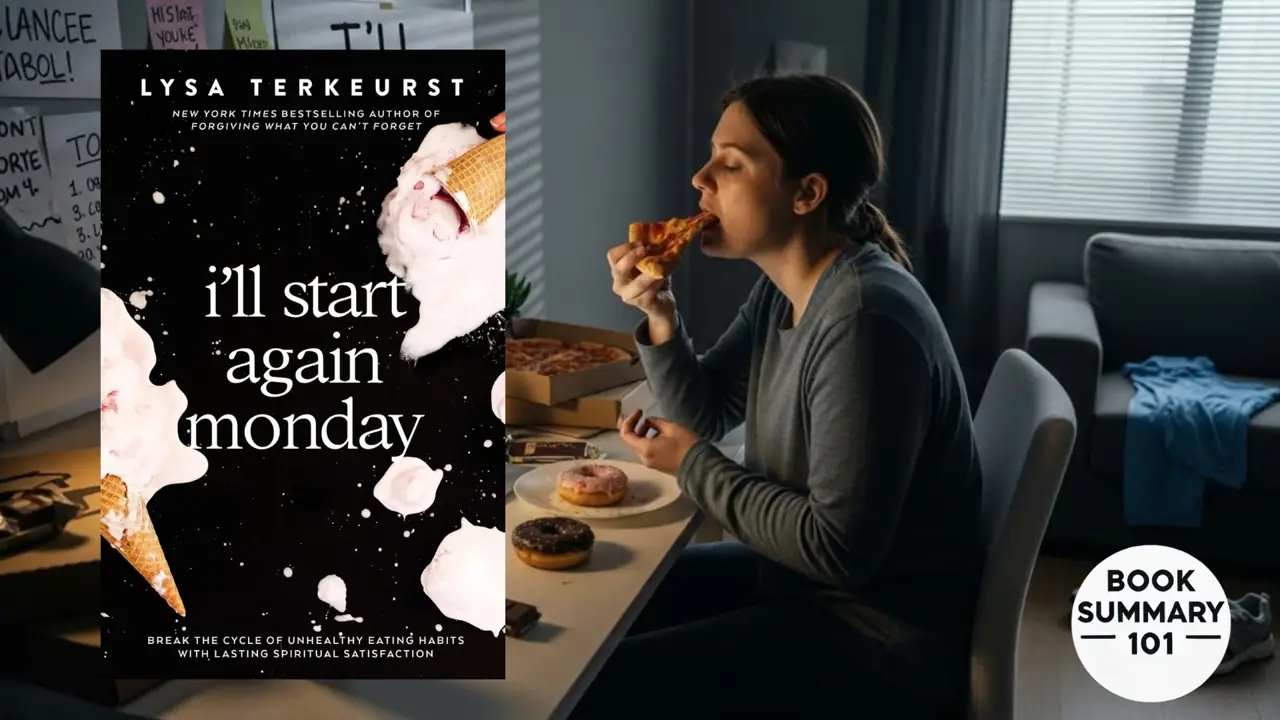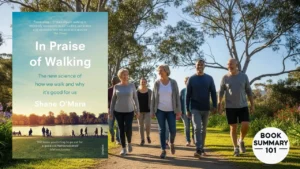We’ve all said it before: “I’ll start again Monday.” Whether it’s after a weekend of overindulging or a stressful week of emotional eating, Monday feels like that magical day when we’ll finally have it all together.
But Lysa TerKeurst’s I’ll Start Again Monday: Break the Cycle of Unhealthy Eating Habits with Lasting Spiritual Satisfaction challenges that mindset. This isn’t just another “how to stop snacking” book—it’s about healing the deeper heart issues behind our food battles.
Lysa’s message is simple yet powerful: food isn’t the enemy. The real issue lies in what we crave—and how we try to fill emotional and spiritual emptiness with temporary satisfaction.
Let’s break down the heart of this book into sections that bring Lysa’s lessons to life.
Why Read This Book?
Because it speaks to your heart, not just your habits.
Lysa TerKeurst doesn’t hand you a list of do’s and don’ts—she hands you hope. She shares her own messy, real struggles and reminds you that you don’t have to carry food guilt anymore.
If you’ve tried every diet and still feel stuck, this book offers a deeper solution: spiritual fulfillment over temporary satisfaction. It’s not about losing weight; it’s about losing the burden of shame and finding grace.
1. Recognizing the Real Problem Behind Food Struggles
Let’s be honest — most of us know what healthy eating looks like. We know we shouldn’t grab that bag of chips or finish the tub of ice cream after a rough day. Yet we still do it. Why?
Lysa TerKeurst dives straight into this uncomfortable truth: the problem isn’t the food itself — it’s the emotional weight we attach to it. Food becomes a refuge when our hearts are hurting. We eat when we’re stressed, lonely, overwhelmed, or even when we feel unseen. For a moment, it feels comforting — like a friend that always says “yes.” But when the satisfaction fades, guilt steps in and whispers, “You failed again.”
Lysa calls this the cycle of craving and shame. It’s a pattern that starts in the heart, not the stomach. The real hunger, she explains, often isn’t physical. It’s a deeper longing — for peace, for control, for connection.
She invites readers to pause and ask themselves one powerful question:
“What am I really hungry for?”
Maybe you’re craving comfort because life feels uncertain. Maybe you’re craving attention because you feel invisible. Or maybe you’re craving rest in a season that won’t slow down. When we identify the real hunger, we can start feeding it the right way — not with food, but with truth and spiritual nourishment.
The healing begins not with a diet plan, but with honesty.
2. Inviting God Into the Cravings
Here’s the turning point: Lysa reminds us that we don’t have to fight our cravings alone.
In most diet cultures, the message is “try harder.” More willpower. More discipline. More rules. But Lysa turns that idea upside down. She says that what we really need is dependence, not discipline — dependence on God’s strength in our weakest moments.
When you feel that familiar pull to eat out of stress or sadness, Lysa encourages you to stop and pray — even if it’s just a whisper:
“Lord, I need You right now.”
This small act of surrender becomes a spiritual anchor. Over time, it transforms those moments of temptation into opportunities for connection.
She shares simple, faith-based strategies that make this practical:
- Pause before you eat and ask God for clarity: “Is this physical hunger or emotional hunger?”
- Replace negative self-talk with scripture or gratitude.
- Use small victories — like walking away from a craving — as moments to celebrate God’s faithfulness, not your own willpower.
By inviting God into your cravings, you start to break the power they hold over you. You stop viewing food as your comfort and begin to experience a deeper satisfaction that lasts beyond the plate.
This isn’t about being perfect — it’s about being present with God in every imperfect moment.
3. Rewriting the Story: From Guilt to Grace
If there’s one emotion that traps people in cycles of unhealthy eating, it’s guilt.
We binge, feel bad, swear we’ll do better, restrict ourselves, then binge again. It’s exhausting — and Lysa knows that pain firsthand. She admits that she’s lived that same pattern, often using food as a coping tool and then punishing herself afterward.
But she discovered something freeing: God doesn’t shame us — He redeems us.
Every time you “mess up,” you have a choice. You can sink into guilt, or you can rise into grace. Lysa teaches that guilt says, “I’m a failure,” while grace says, “I’m learning.” That subtle shift changes everything.
She also reframes self-control as a gift, not a burden. It’s not about restriction — it’s about protection. Self-control protects you from regret and invites peace into your decisions. It’s a form of self-love rooted in divine wisdom.
When we approach food (and ourselves) with grace instead of judgment, healing becomes possible. We stop striving for perfection and start living in progress — one meal, one prayer, one moment at a time.
4. Building Habits That Last
Lysa doesn’t promise a miracle cure — she offers something better: realistic, lasting change.
She guides readers to stop chasing “quick fixes” and start building rhythms that support long-term growth. Because the truth is, transformation happens slowly — but it does happen.
Here are some of her most powerful strategies:
- Set small, achievable goals. Instead of saying “I’ll never eat sugar again,” start with “I’ll pause before dessert tonight.”
- Create ‘pause moments.’ Before eating, take a deep breath and check your motives — are you feeding your body or your emotions?
- Write and reflect. Journaling helps you track emotional triggers and celebrate progress you might otherwise overlook.
- Don’t let one mistake define you. One bad day doesn’t undo weeks of growth. It’s just one page in your story.
Lysa emphasizes consistency over intensity. It’s better to make one sustainable change than to burn out after a week of “all or nothing” effort.
She also reminds readers that community matters. Having supportive friends or a faith group makes the journey easier — because transformation grows stronger in connection, not isolation.
Bit by bit, these choices build a new way of living — one where peace, not perfection, becomes your goal.
5. Living in Lasting Satisfaction
In the final section, Lysa invites readers to experience what she calls “lasting satisfaction.” It’s not about cutting out food you love; it’s about filling your heart with what truly satisfies.
When we chase diets, we often focus on what to remove — sugar, carbs, calories. But Lysa flips the focus to what to add: faith, joy, grace, and peace. When your heart is full, the urge to fill it with temporary comfort fades naturally.
She paints a picture of what true freedom looks like:
- You enjoy food without guilt.
- You stop equating your worth with your weight.
- You feel peace whether the scale moves or not.
- You stop waiting for Monday because you know every day is a fresh start.
Her message is deeply spiritual: our ultimate satisfaction can’t come from anything that sits on a plate. It comes from being fully alive, fully seen, and fully loved by God.
This realization doesn’t just change your eating habits — it transforms your entire relationship with yourself.
Real-Life Examples
Lysa’s honesty is what makes this book so powerful. She doesn’t write as a teacher looking down at readers—she writes as a woman who’s been through the struggle.
One of the most touching stories comes from a simple, ordinary moment. Lysa describes sitting in her car, feeling defeated after breaking her “no sugar” promise yet again. She felt heavy — not just physically, but emotionally. That’s when she whispered a small prayer:
“Lord, help me crave You more than I crave this.”
It wasn’t dramatic. It wasn’t perfect. But it was real — and it marked the beginning of transformation.
In another story, Lysa talks about standing in front of her pantry late at night. She wasn’t hungry; she was tired and anxious. Instead of grabbing a snack, she decided to pause. She realized she wasn’t craving food — she was craving peace. So, she took that moment to breathe, pray, and go to bed. It wasn’t easy, but it was a victory — one that grew her spiritual muscle of self-awareness.
She also shares moments of failure — days when she ate emotionally and felt discouraged. But what’s powerful is what she did next: she chose compassion over condemnation. She reminded herself that growth isn’t linear, and grace always leaves room for another chance.
These stories make the book human. They remind you that transformation isn’t about perfection — it’s about progress, faith, and learning to show yourself the same kindness God does.
Join the Conversation!
What if, instead of waiting for Monday, you started again now?
This book isn’t just about food—it’s about freedom. It’s about learning to stop using guilt as motivation and start using grace as guidance.
So let’s talk:
👉 Have you ever found yourself saying, “I’ll start again Monday”?
👉 What helps you feel more grounded when life feels out of control?
Drop your thoughts below, and let’s start this conversation—today, not Monday.
5 Quotes from I’ll Start Again Monday
📖 “We were made for more than the cycle of defeat.”
Meaning: You’re not meant to live trapped by shame or old habits—your purpose is greater than your struggles.
Simple Terms: You’re stronger than your bad patterns; there’s more to you than food battles.
📖 “God made us capable of craving so we’d crave more of Him.”
Meaning: Our desires aren’t bad—they’re meant to point us toward something eternal, not temporary comfort.
Simple Terms: Cravings can guide us to God, not just to food.
📖 “Self-control is not about deprivation—it’s about direction.”
Meaning: True discipline isn’t punishment; it’s steering yourself toward peace and purpose.
Simple Terms: Saying no now helps you move toward something better later.
📖 “Condemnation defeats us, but conviction redirects us.”
Meaning: Feeling guilty keeps you stuck, but gentle conviction can help you grow.
Simple Terms: Guilt tears you down; awareness lifts you up.
📖 “Small victories add up to big freedom.”
Meaning: Every little choice matters—change doesn’t happen overnight, it’s built one moment at a time.
Simple Terms: Even tiny wins bring real progress.



